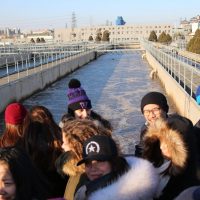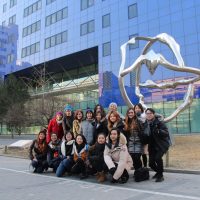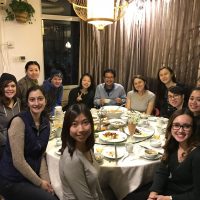Environmental Studies majors take part in a unique 3-quarter Capstone experience combining professional development, a built-in internship (locally or abroad) and a public presentation tying in their academic research with their practical on-the-job work. Students gain valuable hands-on experience exploring potential career paths and they build communications, research and analytic skills that serve them well beyond their time at college.
Read more about what the student experience is within our Capstone, in this second post in our Student Capstone Q&A Series.
Joy Shang
Capstone Internship focus: Analyzing visitation in WA state parks and potential barriers to disenfranchised populations
Capstone organization: Washington State Parks Foundation (WSPF)
UW faculty mentor: Dr. Clare Ryan

Why did you choose this internship?
I chose to intern with WSPF because they offered an opportunity to work on policy issues, an area I wanted to gain more experience in. I think a lot of the environmental challenges we are facing today – such as climate change, plastic pollution, and air quality – are affecting people on a broad scale and thus need broadly impactful solutions. Environmental policy is a way to integrate better behaviors into our corporations and institutions, but that won’t happen without passionate and knowledgeable people pushing for change.
I was also immensely impressed by the passion and insight that my mentors at WSPF displayed. Even though I knew very little about state parks, their dedication reminded me of how important parks were for the development of my own love for nature and that the more people can visit them, the better.
What environmental challenges are you addressing? Why is it important?
After the 2008 recession, Washington state parks began requiring an entrance fee for the first time in its almost 100-year history. This pass was implemented out of necessity, but unfortunately, parks did not have the luxury to consider the ramifications of putting a price on nature. While the “Discover Pass” is not a huge financial burden to most – $30 for an annual pass and $10 for a day pass – it still erects a barrier to visiting parks. Furthermore, the people most likely to be hindered by this fee are also those who are already visiting parks in lower numbers, namely those of racial and ethnic minorities, young adults, low-income, and low education level.
As such, for my internship I wanted to look into possible disparities between Washington’s increasingly diverse population and park visitors. After all, our parks were created to be enjoyed by all.
What are the goals of this internship and what are your expected deliverables?
For my internship I am developing four infographics that highlight little-known facts about the Washington state parks, such as how 80% of their funding comes from user fees. The purpose of these infographics is to not only educate the general public, but may also be shown to public officials to lobby for increased funding or new parks.
I also helped complete a survey to state parks agencies and nonprofits across all fifty states, then analyzed the results in conjunction with a national survey of state parks. I utilized this data for my infographics, and also created interactive graphs on Tableau, a data visualization software.
What does a day in the life of your internship look like?
I typically arrive at the office around 8:45am and mentally prepare myself for the day with a cup of cold brew. WSPF’s office is a really cute space in Ballard with little succulents, a whiteboard wall, and convertible standing desk. What I’m working on varies by the day. I could be interviewing the Assistant Director at North Carolina State Parks, sorting through thousands of data entries on land acquisition, or meticulously crafting an image of a kid with a backpack for an infographic.
To liven up my days of working at a computer, my supervisors invite me to sit in at meetings that have allowed me to meet key players in the parks and recreation field, like an advisor to Gov. Jay Inslee, as well as learn what goes into managing a nonprofit.
What skills have you learned throughout this internship?
In order to effectively display the immense amounts of data I have been collecting, I’ve been learning Tableau, a powerful data visualization software that can create beautiful interactive graphs. Tableau has so many options that I feel I have barely scratched the surface, but I’m really proud of some of the visualizations I’ve made so far.
I’ve also had the opportunity to learn about political processes by meeting with public officials and picking it up from my supervisors. For instance, I now know the difference between a capital budget and operating budget, as well as the legislative mechanisms leading to the passing of said budgets.

What is the most memorable moment of this internship so far?
I fondly remember the day I finally received the last response to my survey to all 50 state parks agencies. The last state I was waiting on was New York and I had been talking to them for over a month. The guy who answered their main line knew me by name. They were supposedly working on my survey, but it had been weeks and there was nothing I could do but keep emailing and calling them at intervals that I hoped wasn’t too annoying. I was tempted to give up, but the satisfaction of achieving a full set of 50 states fueled me. Eventually, I decided to pursue an alternate route: I contacted a nonprofit in New York and the director reached out to their contact in the agency. I came into the office the next morning to find that beautiful survey pop up in my inbox. I jumped in my seat and pumped my fists in the air. Later that day, we celebrated with artisanal ice cream.
What are your career aspirations once you graduate?
As an incoming senior, this is an answer that I’m supposed to know by now. The “correct” answer is that I want to have a career in environmental policy, creating policies that will support communities to be more sustainable and approach the pressing environmental issues that we are facing from an interdisciplinary perspective. That being said, my ultimate goal is do something impactful with my life. The environment is shared by every person on every corner of the Earth, and taking care of it means that we are also caring for each other.


























